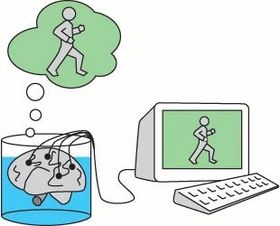
Why are we able to do something so paradoxical?
Thinking is what powers our body to do stuff we want it to do. But why are we aware of this?
https://theconversation.com/thinking-critically-on-critical-thinking-why-scientists-skills-need-to-spread-15005
If you’re anything like me you tend to question a lot of things. Maybe you don’t, and honestly, that’s fine too. Perhaps I can touch on this later on, but for now, just bear in mind the fact that many brains in many humans have the capability to question and examine things. In order to do that, one needs to come to terms with that which is around them… and inside them. Something that’s astonishing to me is the fact that your brain not only serves as a physical mechanism for physical activity (such as moving your legs or regulating your breathing) and mental mechanism for internal activity (your thoughts), but it also is aware that it’s able to do these things. How crazy is that?
This feature of our existence involves self-awareness.
Self-awareness involves being aware of different aspects of the self including traits, behaviors, and feelings. Essentially, it is a psychological state in which oneself becomes the focus of attention.
-verywellmind.com
So why is it that in a world that is inherently external, we are able to turn our attention the other way? After all, we experience things directly that are happening “out there”… for example, a car passing by, the sensation of grass touching our skin, or the sound of notes being played on a piano. Perhaps it has something to do with our ability to see the external world, starting from the inside. We must ask, Is the world really external? It’s true we experience things that are separate from our being, however, we also experience things that are a part of our own being. We might hear piano notes, but we also feel piano notes. Do they sound pleasant? Are they out of tune and painful to listen to? The world doesn’t send forth those answers, only you who experiences the external phenomena knows the answers.
Without a brain, there would be no perception of the external- even if this world, for example, did still exist, without the right “equipment” to interact with it, so to speak, we wouldn’t be able to perceive it. So really, the existence of an external world that we can interact with starts from one’s own ability to perceive it. One must start internally to understand experience.
With the brain in a vat theory, a brain is in a vat and believes it is walking. To achieve this, it needs to first generate thought and beliefs, none of which exist externally.
Is that still not odd though? That in order to see what is outside, you must first possess an inside? It seems like a bit of a balancing act. But perhaps it’s more that just understanding the external world: It seems as though our brain possess the ability to understand, period. Granted, there are things no human understands: like why we exist, or how the universe was created. At the same time, we understand that we don’t understand these things. How do we come to question things beyond our own existence, though? After all, if perception starts in the brain, and is projected to the outside world, wouldn’t the environment reflect back only what is there? In other words, shouldn’t your perception be influenced solely by the environment around you, if the environment around you is the only thing that really exists?
Because this is not the case, it must be true then that something else is going on. At the root of understanding is where consciousness comes into play.
Consciousness, at its simplest, is sentience or awareness of internal and external existence.
-The one and only, wikipedia
Without consciousness, thinking wouldn’t be possible as we understand it. A blade of grass, for example, is an unconscious and animate object. An emotion such as anger is not able to be experienced by such a thing. The blade of grass isn’t able to envy the piece of grass next to it because it is bigger. It cannot even understand how big it is in the first place, or how it feels about being that big. It just is, it is not able to perceive itself. On the flip side, humans can perceive the same blade of grass, understand it is a blade of grass, and judge the blade of grass next to it for being bigger. Consciousness is present in the person, not in the grass, and so it seems that the person is able to understand things that the grass cannot (which is a good thing, a piece of self-aware grass is kind of creepy in my opinion). Both people and grass exist in the outside world. Yet, both organisms act and experience in completely different ways (that is, if grass can experience at all).
Perhaps it is consciousness itself that allows us not only to process things that happen in the outside world, but process our own reactions and thoughts about those happenings. As I explained before, the human brain is a mental mechanism that partly regulates unconscious processes, such as breathing. A blade of grass is able to “breathe” and “eat” as well… but these are not conscious processes, they are regulated without our thought. Conscious thought, on the other hand, seems to expand beyond that of the unconscious. Thought is a broad term, and can cover a spectrum of things, both existing and non-existing. Consciousness allows us self-awareness, and the option to govern thought. In a way, your conscious brain is a bit like an odd boat- rather than being a passenger, it allows you to become the captain, and veer it in any which way you’d like.

What are your thoughts? Do you have any stories or disagreements? I'd love to hear them. Perspective is only as big as your own experiences; it is something that should not always be permanent.

The twitter button is currently not functioning. Please use this link until it is fixed, thanks…
https://twitter.com/as_thoughts_